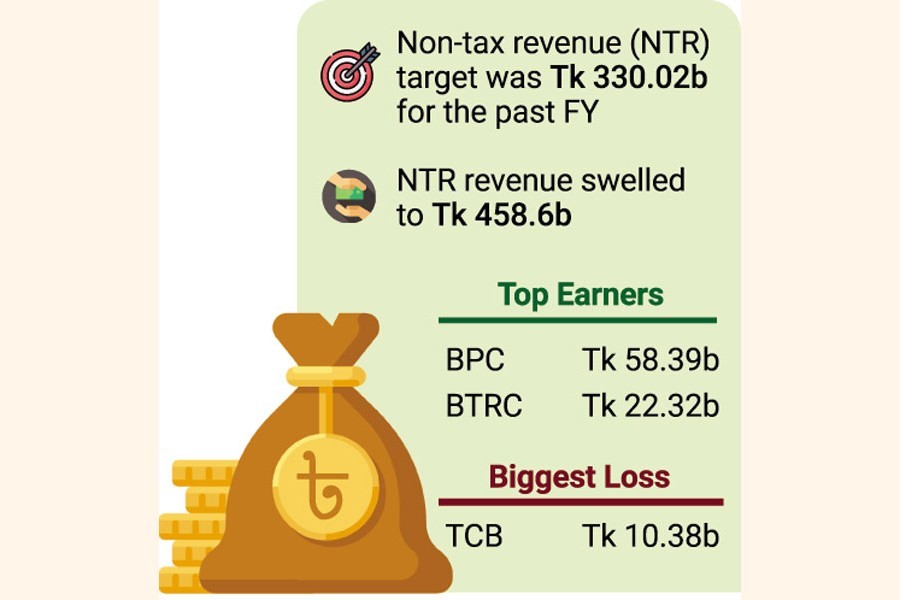Non-tax revenue (NTR), the second-biggest source of government revenues, saw a quantum leap in the past fiscal year following a reform conducted for enhancing resources from state-owned enterprises, sources say.
Bangladesh Economic Review 2021, released Wednesday, says the receipt of NTR, consisting of mainly dividends and fees of government-owned entities, swelled to Tk 458.6 billion, up by nearly 130 per cent, during the period from July 2020 to May 2021.
The NTR target was Tk 330.02 billion for the past fiscal year ending June 30. It was 1.15 per cent of the country's GDP.
People familiar with the development told the FE that the government enacted a law to increase resource collections from the state-owned enterprises or SOEs.
There are some government-owned organisations which fetch blockbuster earnings each year. They belong to mostly power-and energy-related organizations, including Bangladesh Petroleum Corporation (BPC).
The state corporation made the highest net profit amounting to Tk 58.39 billion followed by Bangladesh Telecommunications Regulatory Commission at Tk 22.32 billion during the last fiscal year.
On the other hand, the state-owned Trading Corporation of Bangladesh incurred the biggest loss in the year under review. Its losses ballooned to Tk 10.38 billion.
After the enactment of the law in parliament, such state-owned entities which earlier used to share only dividends now pay almost all surpluses to the national exchequer.
It came as a boon at a time of crunch--big jump in NTR helped offset the overall drop in resource mobilsaiton in the past fiscal year, according to the publication.
The publication says the rise in overall revenues occurred as the surplus money from autonomous, semi-autonomous, state-owned and public non-financial corporation was deposited with government treasury.
In FY 2019-20, NTR collection was Tk 439.3 billion.
The annual publication says, "The stagnant situation in the world economy as well as the pressure for increased public expenditure to face the ongoing covid-19 pandemic constituted challenges on the revenue-mobilisation system of Bangladesh."
The total revenue mobilisation revised target was Tk 3.5 trillion in FY 2020-21, equivalent to nearly 12 per cent of the GDP.
The government publication, however, says inflation target rate for FY 2020-21 was 5.4 per cent. But the actual inflation rate reached 5.56 per cent, slightly higher than the estimate. Food inflation was 5.73 percent and nonfood inflation 5.29 per cent.
The capital-market situation was found positively working in FY 2020-21 though both Dhaka and Chattrogram Stock Exchanges were volatile for a while.
"Overall, there was a mentionable growth both in the capital and value index." The growth of broad index for Dhaka Stock exchange was 37.37 per cent and for Chattrogram Stock Exchange 39.84 per cent.
The review report says programmes and strategies have been advanced to achieve SDGs and environment-related targets.
From FY 2009-10 to FY 2020-21, Tk 39.00 billion has been allocated to the Climate Change Trust Fund. Some 789 projects have been approved, 728 projects implemented under different ministries/divisions and 61 projects have been implemented through NGOs.


